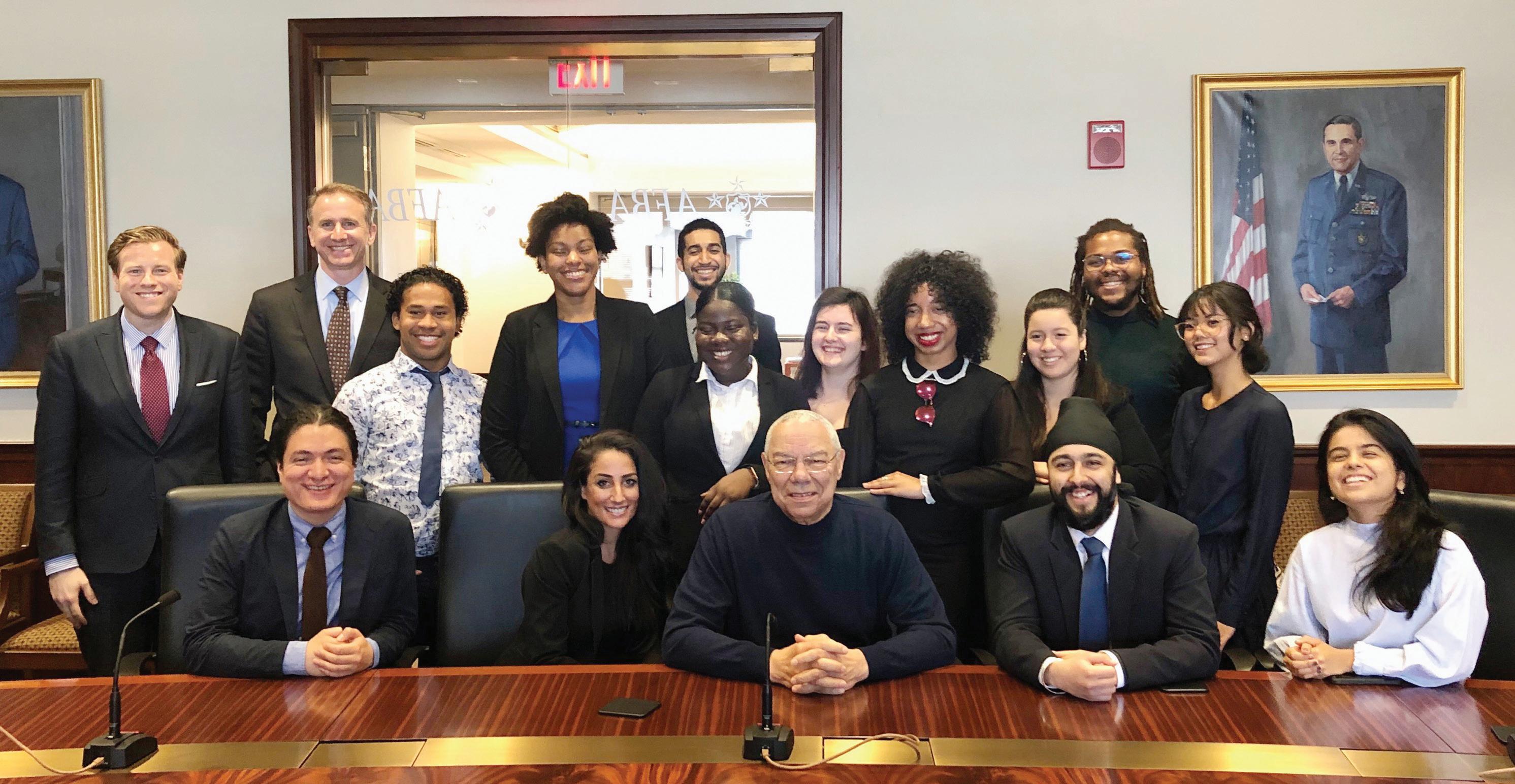
17 minute read
PROGRAMS OF EXCELLENCE
Preparing students for leadership is central to the mission of the Colin Powell School. Helping them find paths to positions of power and influence— to places where they can make a difference—is an important part of that project. To that end, six years ago, the Colin Powell launched its Semester in Washington, DC Program. Each Spring, with the generous support of the MCJ Amelior Foundation, we take fifteen Colin Powell School students to Washington, DC for semester-long public service internships and special courses and programs led by seasoned practitioners.
In 2018-19, the program was organized as a partnership between the Colin Powell School and the Joseph R. Biden, Jr School of Public Policy and Administration at the University of Delaware. Each school sent fifteen
Advertisement
SEMESTER IN WASHINGTON DC
students, most of whom interned on Capitol Hill. The two in-person seminars were taught by Jon Cardinal, Director of Economic Development for Senator Kirsten Gillibrand, and Mike Donilon, Senior Adviser to former Vice President Joe Biden. Over the course of the semester, the students had the chance to meet many senior political leaders. They spent several hours each with General Powell and with former Vice President Biden. Over the past six years, a third of the students who spent the semester in DC have stayed on in Washington in full-time public service positions. All of them have left the experience with a clearer sense for how to be leaders in service to our nation.
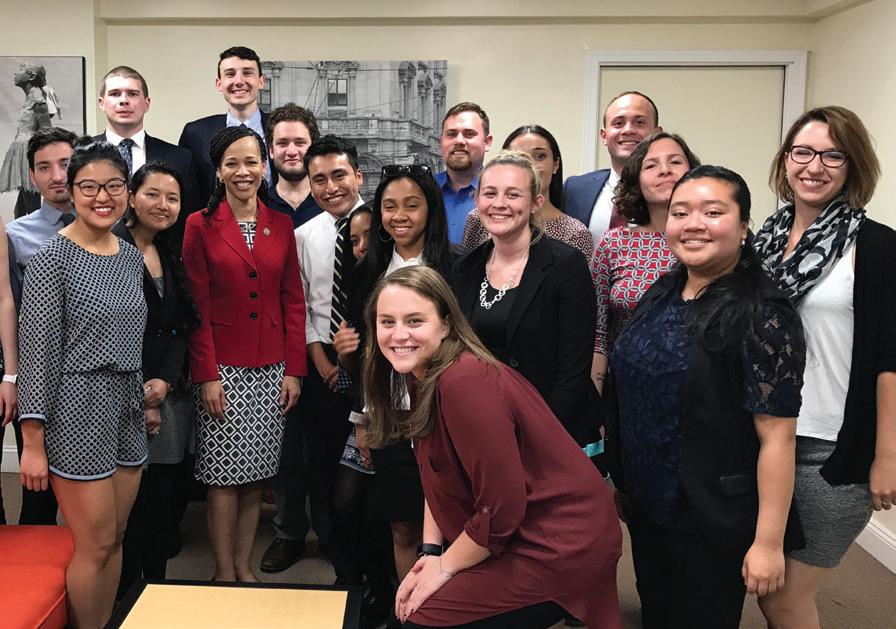

As Layana Abu Touq, one of the recent Semester in DC participants, explains, “Coming from a Muslim Palestinian background, I was born into politics,
WALK
THROUGH THESE DOORS

CHANGE
THE
WORLD
but I did not think of politics as more than an interest. The DC program was eye-opening. I interned with the U.S. House of Representatives for Congressman Jerry Nadler (NY-10). He had just been promoted within the Judiciary Committee but was still short on staff. With limited staffers and numerous constituent demands, I developed my abilities to multi-task and work efficiently in a fast-paced environment. The experience was very important regarding my career choices after graduation. It made me realize the disconnect between some politicians in DC and the public. It made me want to come home to New York City and engage with people to make a difference in politics and policymaking.”
To date, more than seventy students from the Colin Powell School have had career-defining experiences in Washington, DC. Participation in the Semester in DC is as competitive as any program within the Colin Powell School. We are grateful to the MCJ Amelior Foundation for underwriting the students’ experiences and to the ranks of public service leaders and offices in Washington, DC, who have so warmly welcomed our students to the nation’s capital. The experience was very important regarding my career choices after graduation. It made me realize the disconnect between some politicians in DC and the public. It made me want to come home to New York City and engage with people to make a difference in politics and policymaking.
PROGRAMS OF Excellence
SKADDEN, ARPS HONORS PROGRAM IN LEGAL STUDIES
Law is the least diverse profession in the United States. In a 2017 survey of law firms by the American Bar Association, only three percent of attorney respondents identified as black; only 3.6 identified as Hispanic. The legal profession—and especially private law firms—trail well behind accounting, medicine, and academia in achieving racial and socioeconomic diversity. Ten years ago, the Skadden, Arps Honors Program in Legal Studies was created to address this challenge.
Over the past decade, the Skadden PreLaw Honors Program has refined a successful approach to recruiting, supporting, and preparing young people from backgrounds historically underrepresented in the legal profession—primarily low-income students of color—to attend and thrive in law school. Professor Jen Light, the program’s director, explains that the key to success has been a cohort model that builds community among students who are mostly first in their family to go to college—and, for sure, first in their families to aspire to law school. The students receive intensive mentoring and professional development, access to internships and special seminars, and free LSAT preparation.
In 2019, Best Value Schools rated the Colin Powell School’s pre-law program as the fifth best in the nation. It describes the program as “the most affordable in this pre-law degree ranking, and yet the school hasn’t cut any corners in building its curriculum. Above all, this university emphasizes the need for lawyers with sharp critical thinking, decisionmaking, and analytical skills. As such, the curriculum focuses on developing these strengths rather than sticking to a single academic subject.”
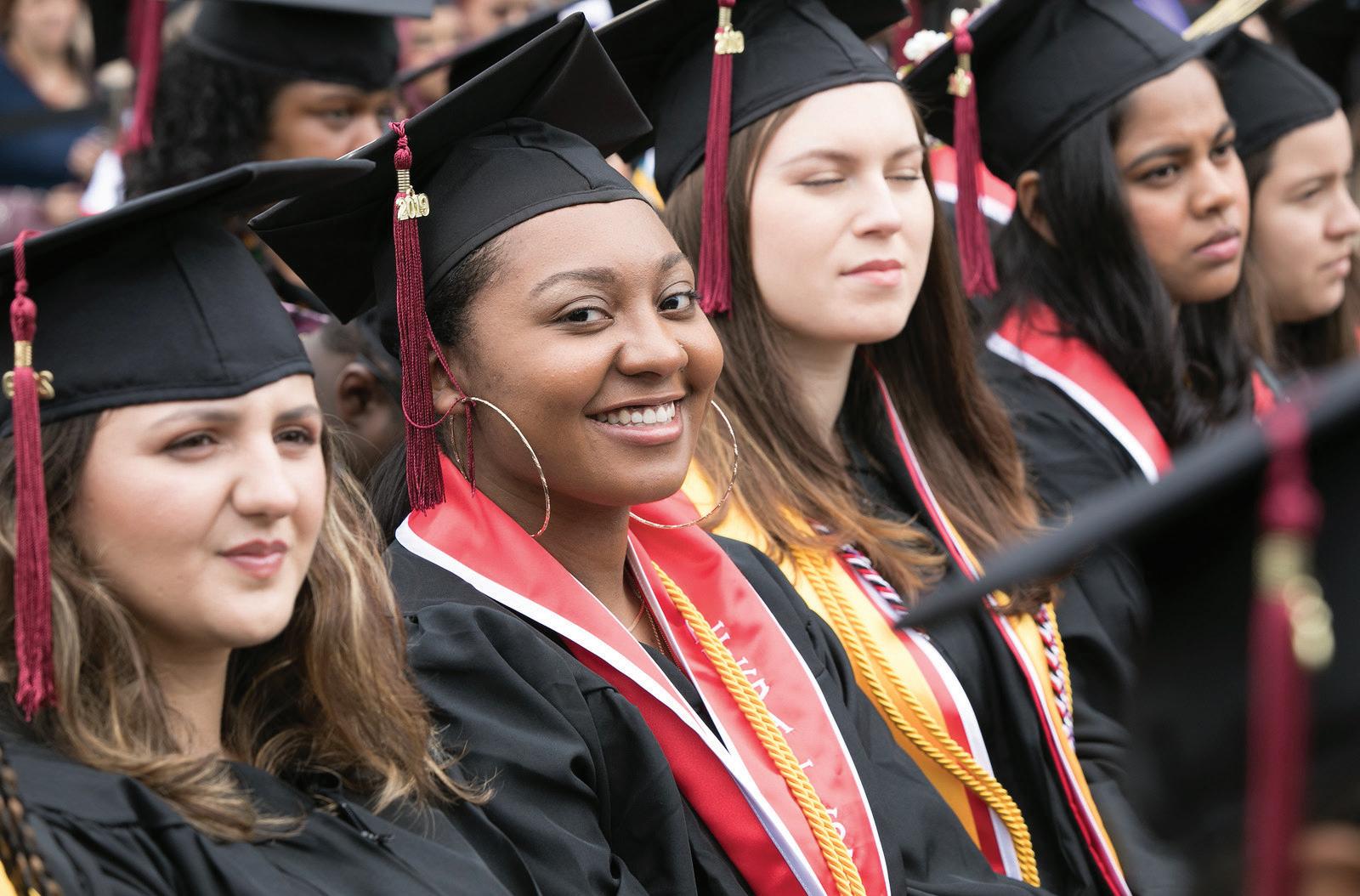

The Skadden Program has sent more than 100 students to law school. Seven have gone to Yale and Harvard—with three accepted to Yale Law School in 2019. Almost half have attended law schools ranked in the top fifty. The program’s recruitment and support mechanisms produce a roughly twothirds yield to law school—far higher than most pre-law programs. Our alumni now work for top law firms as well as government and public interest firms. The program’s first decade was generously underwritten by a partnership with the law firm Skadden, Arps. With that support winding down, we are focusing now on broadening the partnership and support for a road-tested and effective honors program, a cornerstone initiative of the Colin Powell School.
THE COLIN POWELL SCHOOL’S MPA: A MANAGEMENT DEGREE FOR SOCIAL IMPACT
Among the ranks of public service leaders, people of color, immigrants, and first-generation Americans are significantly underrepresented. The Colin Powell School’s Master’s in Public Administration takes aim at correcting that problem. Its mission is to recruit and train diverse cohorts of students: 20-25 outstanding candidates each year who are already steeped in community-based work. The program’s central focus is on providing a hands on management degree that equips students with the practical skills, leadership training, and creativity needed to have a transformative social impact. Our students are “doers,” and we equip them to take their values, commitments, and talents to an even higher level.
In 2018-19, women and people of color comprised more than three-quarters of our students, many of whom are first generation immigrants or the first in their families to earn a master’s degree. The students in any given class may speak as many as a dozen languages and hold degrees from public and private colleges both within and outside of New York State, as well as from universities abroad. Most receive scholarship and fellowship support, as well as support for internships between their first and second years of study.
Elvin Garcia is a good example. Born in Brooklyn and raised in the Bronx, Garcia joined the MPA program in Fall 2018 after an unsuccessful run for City Council and three and a half years on the policy staff at City Hall. Garcia says, “I wanted to formalize a lot of my practical skills in government and public service--the things I had learned through experience rather than academically. Coming to CCNY is probably the best decision that I made in my life.” Garcia excelled in his first year of classes, and in Summer 2019 was selected as an Open Society Foundations Presidential Fellow, one of only three fellows named nationally in 2019.
One of the most distinctive qualities of the MPA Program is its practitioner
faculty, who maintain one foot in the field and one foot in the classroom. Their active engagement as public service leaders helps them provide practical training. Experiential learning and community engagement are integral to the MPA curriculum. Team assignments, including the 14-week capstone project that students complete in their final semester, challenge students to work directly with leading organizations across New York City to produce strategic communications plans, impact assessment tools, and policy proposals that address real-life social issues.
The practitioner faculty also make sure our students have an advantage in the job market, and most all of our graduates find positions in public service. In a recent survey, 48 percent of our graduates worked in government, 40 percent in the nonprofit sector, and 12 percent in the private sector or outside of the country. Our percentage of graduates in public service is much higher than most MPA programs. And more than 80 percent of our students report satisfaction that their career makes a difference in the lives of others and is personally fulfilling. This result is evidence of our success in helping our students grow personally, advance professionally, and improve society by making mission-oriented institutions better reflect the people and communities they serve.
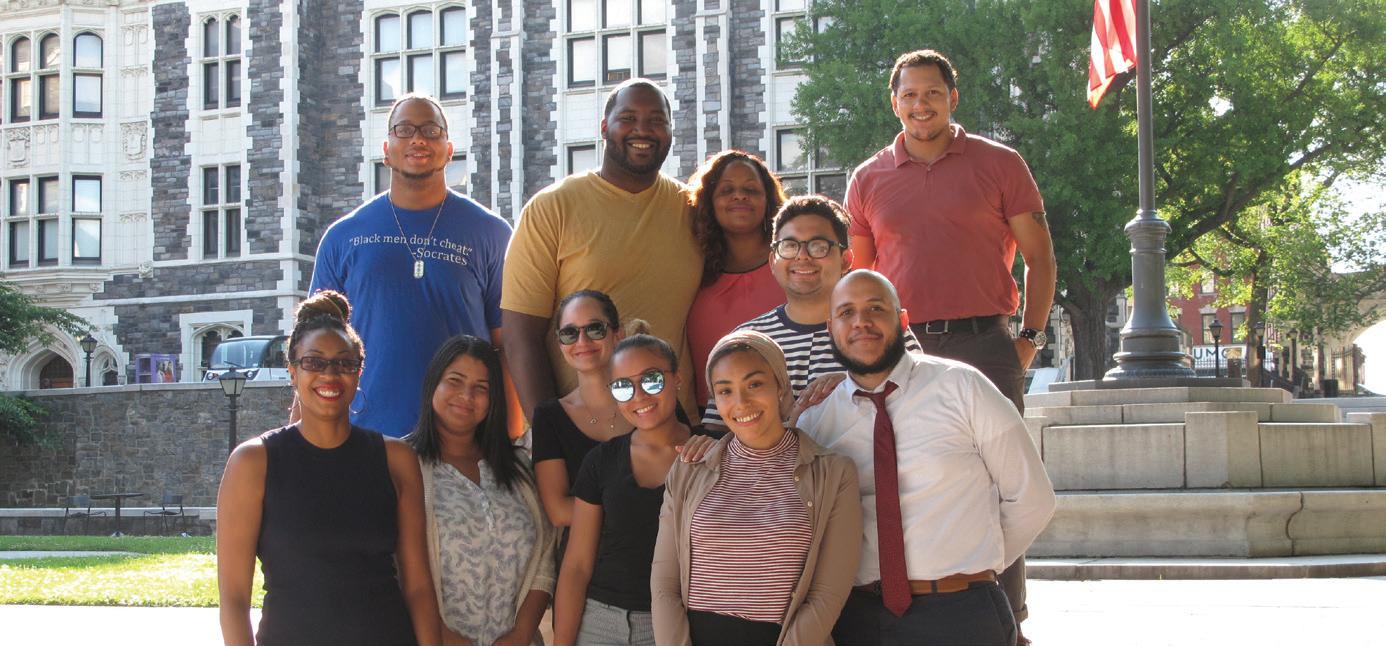
In the years ahead, we plan to grow the MPA program--probably doubling its size--but doing so in a way that maintains the strengths of community and cooperation among the cohorts. We will remain committed to a program where service and leadership are essential values and the measure of our success.
PROGRAMS OF Excellence
COMMUNITY CHANGE STUDIES MINOR TAKES OFF
New York City is rife with inequality, and City College students know it. A study of CUNY students found that 46 percent of those in the senior colleges experience food insecurity and 14 percent experience homelessness in any given year. City College students can take these challenges and turn them into opportunities for social change -- for themselves and for the neighborhoods and communities that raised them. The Community Change Studies Program (CCS) at the Colin Powell School connects CCNY students with community-based organizations around the city, teaching students to exercise not only their passion for change but, more importantly, the analytical and organizing skills that are in increasing demand. Under the leadership of Professors John Krinsky, Director, and Hillary Caldwell, Assistant Director, the Community Change Studies Program has evolved over a three year period from a student minor, combining community organizing, community-based research, and service learning courses taught by the political science department, into a highly transportable and visionary program for preparing the next generation of leaders in community organizing, planning, and civic advocacy. CCS has forged partnerships between CCNY and community-based organizations in New York City, with a range of relationships from internship placements and research collaborations to classroom-based presentations by, and auditing opportunities for, organization staff.
Ultimately, CCS hopes to help meet these groups’ need for staff and leadership from among the low-income and working-class communities where they organize.
Flexible Minor and Conduit For Real World Experience
City College serves predominantly low income people of color and immigrant students who often come from the communities in need of organizing. Our students are deeply aware of their surroundings and come to CCNY to learn how to effectively give back to their communities. The minor in Community Change Studies offers students a structured curriculum of core courses in community organizing, community-based research, and a relevant paid and credit-bearing internship, plus three related academic courses. It also offers students cocurricular studies, cohort-building, and a strong and growing alumni network that facilitates opportunities for students to find employment in the “community change” field. The internship requires students to spend at least 10 hours each week at their designated organization and to attend a weekly two-hour seminar learning specific ways to make the internship as relevant and useful as possible by closely studying the host organization and its involvement with the issues it seeks to resolve. The minor is compatible with any major in the College and can be a conduit for liberal arts students interested in connecting their social science, arts, and humanities studies with advocacy in the “real world,” including research design, collaboration, political and policy analysis, and leadership development in actual work settings. One recent alumnus, Ramon Mendez,
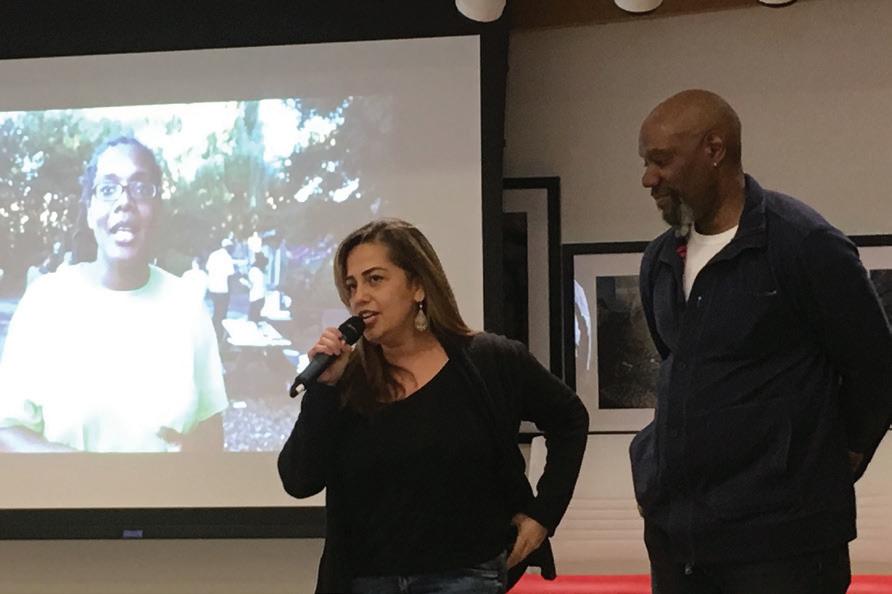
now a housing organizer with the Northwest Bronx Community and Clergy Coalition, explained: “I was a Political Science Major at CCNY but couldn’t find something that connected theory with everyday life and struggles. Once I took my first class in the Community Change minor, I saw how all the things I had learned can be put to use…I was exposed to tenant organizing and solutions to real-life problems I myself face in my community.”
The CCS Program model is both sustainable and renewable. More than seventy-five CCNY students have studied in the program and approximately fifty have declared a minor in Community Change Studies. These courses are taught by practitioners with years of experience in their respective fields. The CCS staff has strong connections across the community change field in New York City and beyond. In addition, an advisory committee of City College faculty and community-organization staff give input to the program and are
especially helpful in suggesting and supporting in-field internships. Hillary Caldwell states, “having instructed or co-instructed all of the minor’s core courses, I have seen firsthand how valuable this program is for CCNY students. It provides them with a range of opportunities to connect their knowledge from experience to their academic work and to their community ties and commitments. Students from across departments at CCNY are eager to embrace these opportunities and the previously unrecognized possibilities they open up for ongoing personal, professional, and community development. The program also fills a niche for our community partner organizations that are seeking to recruit and retain community members and staff. It’s a thrill and privilege to help facilitate these connections at CCNY.” According to Professor Krinsky, in the coming year, the Community Change Studies Program will begin expanding both within and beyond the College. Within the Colin Powell School it will take over responsibility for the Partners for Change Fellowship Program, which funds up to six student internships and an internship seminar annually. The program will also fund every Community Change Studies student’s internship, for which it will need to raise separate support from the CCNY budget that covers many of the the other expenditures of the course work. CCS has already begun to build out a network beyond the undergraduate program that is designed to identify students before they enroll in City
City College serves predominantly low-income people of color and immigrant students who often come from the communities in need of organizing.
Our students are deeply aware of their surroundings and come to
CCNY to learn how to effectively give back to their communities. College. As this work advances, it will include working with organizations doing civic engagement work in public high schools; CCS will help high schools to channel students into college with an option to deepen and diversify their organizing and research skills. The Community Change Studies Program is also forming collaborative relationships with graduate programs such as social work programs with a community organizing track, urban studies and labor studies programs across CUNY, and the master’s in
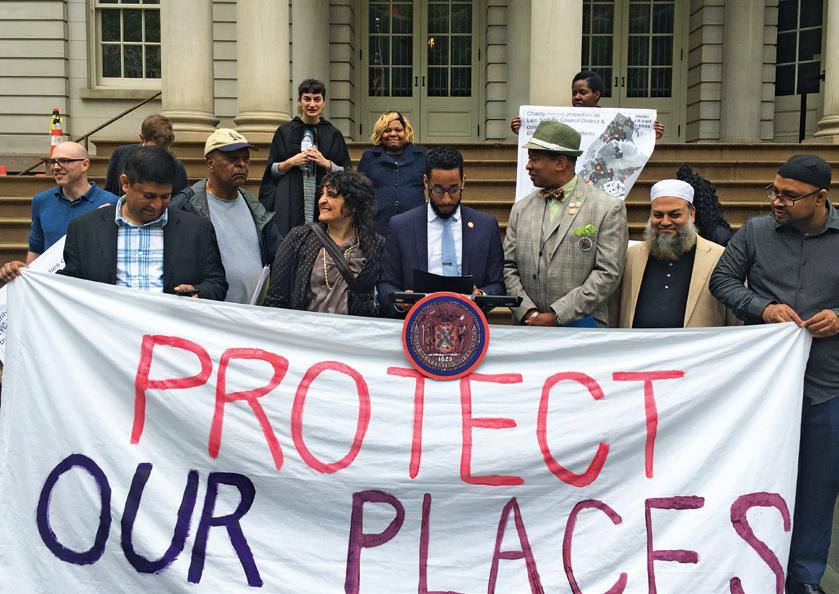
Expanding within and Beyond CCNY

public administration at City College, as well as training programs such as the Center for Community Leadership. These partnerships will clear a pathway for students to continue their studies and sharpen their skills in community change practice so that they will be better positioned to establish careers in the field and prepared to take on leadership responsibility within community-based organizations and advocacy groups. Finally, the CCS Program plans to raise funds for a pilot post-graduate fellowship program to support a full year’s salary for graduates of the program who become organizers in community-based organizations.
“By becoming the fulcrum in a network that can identify interested students in high school and support them through graduate school or early career work, the Program is committed to supporting the work of our students – primarily students of color – in communitybased organizations in low-income neighborhoods, unions, and advocacy groups through the most formative years of their educational lives and cultivate the leaders that these organizations need well into the future,” says Krinsky.
PROGRAMS OF Excellence
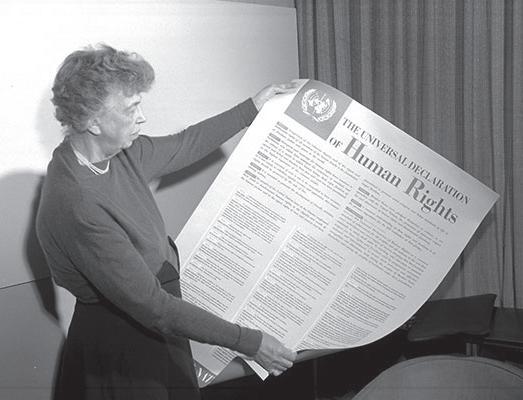
Where, after all, do universal human rights begin? In small places, close to home−so close and so small that they cannot be seen on any maps of the world. Unless these rights have meaning there, they have little meaning anywhere. Without concerted citizen action to uphold them close to home, we shall look in vain for progress in the larger world. - Eleanor Roosevelt
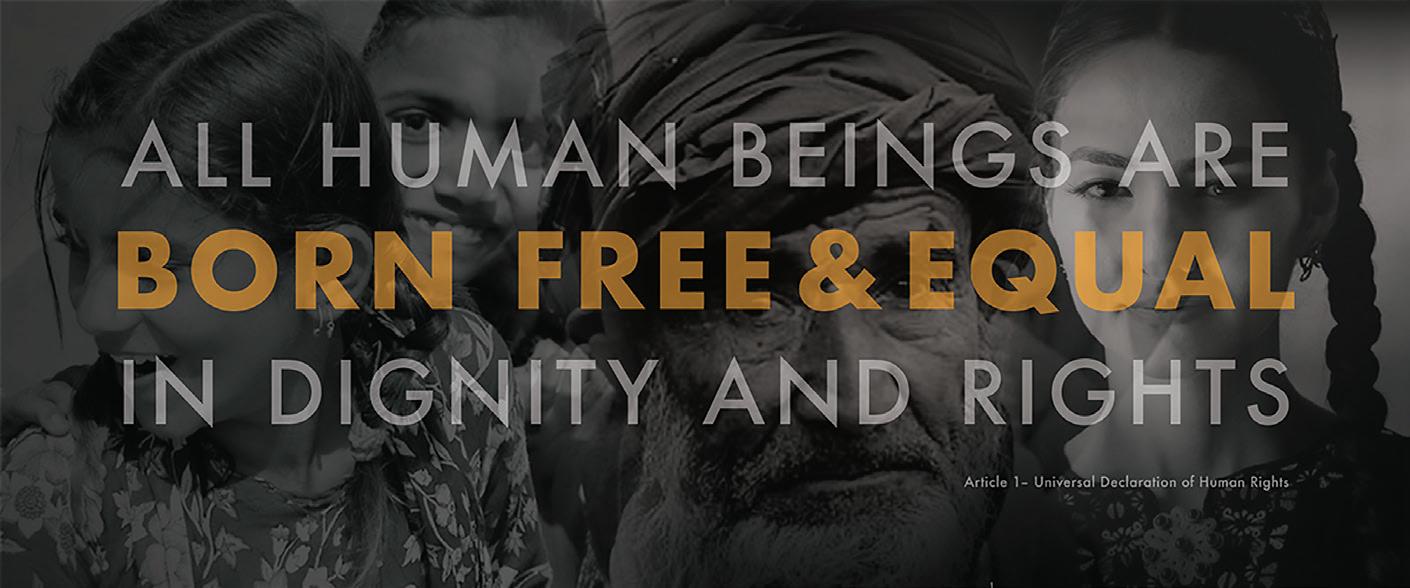
Across the globe, issues of human rights touch millions of people daily. Although the UNESCO Associated Schools Program addressed the need for teaching human rights in a formal school setting in 1953, it was not until the UN’s Decade for Human Rights Education in 1978 that a formal curricula in human rights education was established. Since then, Human Rights Education programs have been established both nationally and internationally at the undergraduate and graduate levels.
CCNY is answering the challenge to deepen the exposure of a new generation of students to credit bearing academic programs in human rights studies at the bachelor’s level and beyond that will educate them about their responsibility to participate in the political process as active citizens. In Fall 2019, the Colin Powell School, the Division of Interdisciplinary Studies at the Center for Worker Education, and the Division of Humanities and the Arts of CCNY are launching a broad program that includes a credit-bearing minor in Human Rights Studies-one of only two in the CUNY system. Dean Andrew Rich has selected Political Science Professor Bruce Cronin as Director of the Program. The program will prepare students for careers in this important and expanding field.
Housed in the Colin Powell School, the program includes a minor in Human Rights Studies, a faculty seminar series, a student internship program, and significant projects and events related to an understanding and advancement of global human rights issues.
CCNY students will now be able to combine a minor in Human Rights Studies with a major in Political Science, History, Philosophy, Sociology, Anthropology, Psychology, English, Asian Studies, Comparative Literature, French, Jewish Studies, Spanish, the MCA department, or Interdisciplinary Arts and Sciences. In addition, upon graduation, they will be prepared for additional study at the Master’s, JD, or PhD level or for entry-level positions in international nongovernmental organizations focused on human
rights monitoring, advocacy, or aid delivery; intergovernmental organizations; government agencies; and nationally and locally oriented NGOs, and university research centers. “The Human Rights program will help to cultivate a new generation of scholars and practitioners who are both knowledgeable and motivated to join the growing community of people around the world promoting human rights and the dignity of all individuals,” Professor Cronin states proudly.
Institutional Reach
In 2013, the deans of the Colin Powell School, the Division of Humanities & the Arts, and the Division of Interdisciplinary Studies at the Center for Worker Education formed the Human Rights Forum (HRF) to bring representative faculty, students, and staff together with domestic and global human rights communities for conversations. The Forum is in its fifth year of programming and has hosted more than fifteen events focused on crucial issues such as genocide, conflict

in the Middle East, torture, migration, humanitarian intervention, and LGBTQ rights. In Spring 2015, the three divisions expanded their reach to form the Human Rights Seminar, a high-level scholar and practitioner monthly workshop to provide critical discussions and scholarly collaboration among academics throughout the CUNY system and across universities in New York City and beyond. The launch of the Human Rights Studies
Program is the third stage of CCNY’s multifaceted investment to advance and preserve human rights.
CCNY: Perfect Venue for Human Rights Studies
CCNY’s demographics and CUNY’s low tuition offer a strong rationale for expanding this valuable field of study at the Colin Powell School. CUNY students, many of whom are immigrants, have been touched by issues of human rights and many feel a commitment to work on human rights issues in their careers. CCNY’s curriculum is strong in relevant disciplines and interdisciplinary studies in the area of human rights. In addition, New York City is a prime location for nonprofit organizations and institutions engaged in human rights work, as well as home to the United Nations, the NYC Commission on Human Rights, the New York State Division of Human Rights, and numerous for-profit organizations that are seeking the skills, knowledge, and responsiveness of young people with human rights training.






